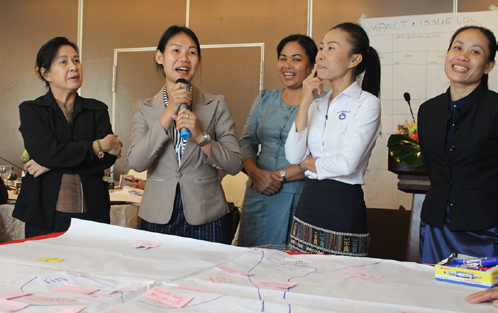The State of Knowledge: Women and Rivers in the Mekong Region (2020) highlights women’s contributions—both actual and potential—to better governance, social, and environmental outcomes for rivers in the Mekong region. The report spotlights women’s achievements in water decision-making and river governance, but also the major barriers to their leadership and “visible” participation. It flags key points of inequity across the six countries of the Mekong region, and also references good practice examples, as defined by women themselves, where women have assumed important and influential roles in governing the rivers and water resources on which they and their communities depend. The findings of the report demonstrate how women in riparian communities are deeply connected to the rivers that sustain their livelihoods, and how they can use their unique abilities and collective sense of responsibility to bring about change.
Inspiration for the State of Knowledge report came from the inaugural Women and Rivers Congress held in 2019. The event brought together close to 100 women from more than 30 countries to celebrate the fundamental roles women play in defending and stewarding freshwater resources, as well as to spur collective action to challenge the deep-rooted gender inequities that women face in their efforts to safeguard rivers and freshwater ecosystems.
One of the key themes of the Congress was to explore different forms of knowledge produced by, and about, women–given their roles and experience in water management, research, and as stewards and primary users of water. The intent was to deliberately bridge the divide between academic, economic and science-based knowledge and that of local people and civil society partners. Out of the Congress a critical mass of participants agreed that we needed analysis and documentation of these experiences at more localized scales.
The first effort on this has coalesced into this “State of Knowledge” report from the Mekong region. This report was developed by International Rivers with input from partners and allies, and supported by Oxfam. Our aim is that this study will be used to shape discussion and dialogue within the movement and beyond, and support the efforts of women, and their supporters, to bring about real and lasting change.
Learn more on the Woman & Rivers Network website.

